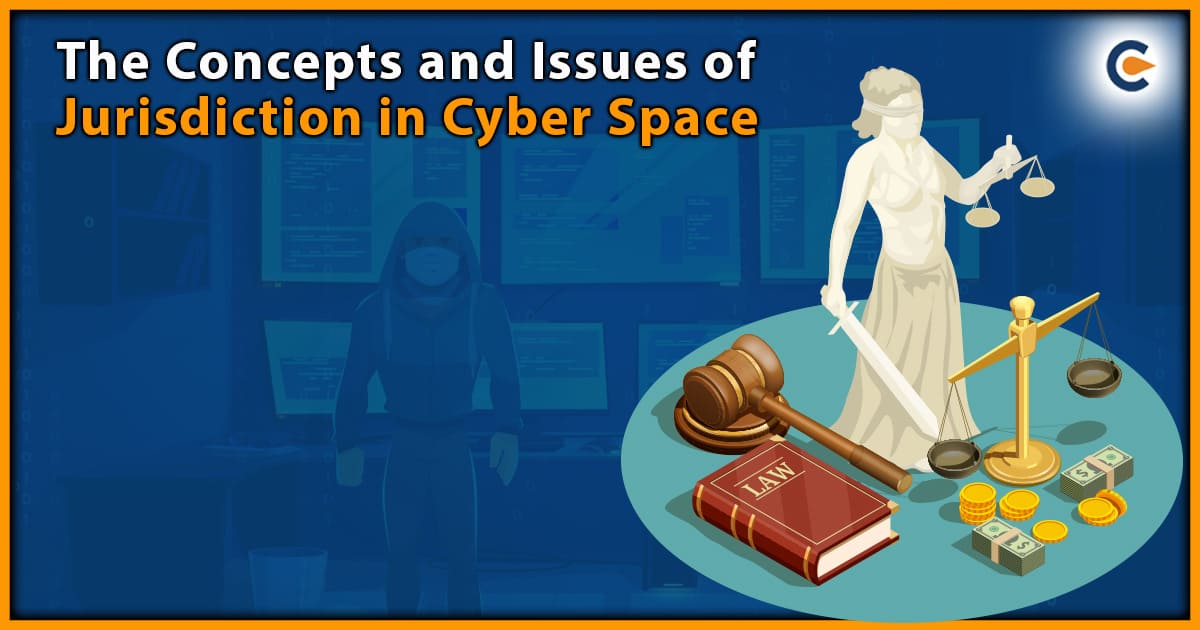Jurisdiction in cyberspace is a complex and pressing issue due to the widespread use of the Internet and other digital technologies. It arises from the challenges associated with regulating and enforcing laws in a space transcending geographical, physical, and political borders. The jurisdictional questions raised in cyberspace are varied, ranging from jurisdiction over data and information to the power to regulate online activity and enforce laws. In this essay, we will examine the concepts and issues related to jurisdiction in cyberspace.
Concepts of Jurisdiction in Cyberspace
The concepts of the jurisdiction in cyberspace are centered around the authority and power of governments to regulate activities, transactions, and data that occur on the Internet. There are generally two types of jurisdiction; territorial jurisdiction and personal jurisdiction. Territorial jurisdiction refers to a state’s power to make and enforce laws within its borders. In contrast, personal jurisdiction is the power to compel an individual or entity to appear in Court or pay fines or penalties for violating a law.
Cyberspace being a global medium, jurisdiction of any kind becomes challenging to establish in cyberspace. It is further complicated because jurisdiction over online activity is often based on where the activity originates and where it is received. Many times it isn’t easy to pinpoint the location of both endpoints at the same time.
Issues of the Jurisdiction in Cyberspace
The issues of jurisdiction in cyberspace arise from the challenges associated with regulating and enforcing laws in a space that transcends geographical, physical, and political borders. Some of the major issues are as follows:-
- Data Jurisdiction: With the increasing storage and processing of data online, disagreeing governments may want to regulate access to such data in a mutually beneficial way. It often leads to debates on where data is stored, where it is being processed, and, based on that, to whom it is subject.
- Security Jurisdiction: Cybersecurity is a significant issue with online data, especially as almost all digital activities are susceptible to hacking and phishing. It raises privacy and security concerns since the nature of cyberspace transcends geographical jurisdiction.
- Regulatory Jurisdiction: Regulatory jurisdiction is the authority to impose legal regulations on activities, transactions, or entities. Since territorial boundaries do not define online spaces, it becomes hard to establish and enforce regulatory jurisdiction over cyberspace-based activities.
- Law Enforcement Jurisdiction: Law enforcement jurisdiction refers to the power of the police or judicial authorities to enforce laws, arrest offenders, or initiate legal proceedings. Due to cyberspace’s complexity and trans-border nature, it is difficult for law enforcement authorities to enforce laws effectively.
- Physical Jurisdiction: Physical jurisdiction refers to the ability of a state to exert control over physical spaces. As cyberspace is outside the physical realm, governments often face problems in identifying the source of a cyber attack or tracing the physical location of a criminal.
| Topic | Explanation |
| Definition of Jurisdiction | The authority of a government to make and enforce laws within its territory. |
| Cybercrime Definition | An illegal activity committed using a computer or computer network. |
| The Territoriality Principle | The principle that laws only apply within the jurisdiction of the government that enacted them |
| Problems with the Territoriality Principle | Difficulty in enforcing laws outside the jurisdiction where the crime occurred |
| The Effects Principle | The principle that laws apply to activities that have a significant effect within the jurisdiction where they occur |
| The Sliding Scale Approach | The recognition of the territorial and effects principles and the use of a sliding scale to determine when a jurisdiction has jurisdiction |
| Jurisdictional Conflicts in Cyberspace | The difficulties that arise when multiple jurisdictions claim jurisdiction over the same activity in cyberspace |
| International Cooperation | Efforts by governments and others to collaborate in addressing problems related to jurisdiction in cyberspace |
| Mutual Legal Assistance Treaties | Agreements between countries that provide for the exchange of information and the provision of assistance in criminal investigations and prosecutions |
| Future of Jurisdiction in CyberSpace | The development of new approaches to addressing issues of jurisdiction in cyberspace, including the use of international laws and norms |
The Elucidation of Jurisdictional Aspects in Cyber Law
The Jurisdictional Aspects of the Cyber Law and Information Technology Act are crucial to understanding as individuals, businesses, and governments rely on the Internet for various activities. Cyber law is vital in regulating cyber activities with legal implications in today’s digital era. The following are the divisions of headings that can help elucidate jurisdictional aspects in cyber law.
- Jurisdictional Strategies in Cyberspace: This section delves into the legal framework of jurisdiction in cyber law. It examines the different methods that different countries employ to regulate cyber activities with legal implications. The section also discusses the challenges when a country attempts to exert jurisdiction over an individual or entity in another country.
- Jurisdictional Conflicts and their Resolution: This section discusses the challenges that emerge when different countries have conflicting laws that regulate the same cyber activity. It explains the concept of conflicts of law and analyzes cases where jurisdictional conflicts emerge and how they were resolved.
- Extraterritorial Jurisdiction in Cyber Law: This section discusses the legal basis for extraterritorial jurisdiction in cyber law. It examines the extent to which a country can exercise its legal authority over an individual or entity in another country. It also considers the challenges that arise when a country attempts to exert extraterritorial jurisdiction and the legal consequences of such attempts.
- Jurisdiction in International Cyber Crimes: This section highlights the international laws regulating cyber activities with legal implications. It examines the role of international treaties and conventions, such as the Convention on Cybercrime, in regulating cyber activities. The section also discusses the legal challenges when different countries attempt to prosecute individuals or entities for international cybercrimes.
- Jurisdiction under the Information Technology Act, 2000: This section discusses the jurisdictional aspects of the Information Technology Act, 2000, India’s primary legislation regulating cyber activities. It examines the provisions of the Act related to jurisdiction and the legal consequences of not following the Act’s jurisdictional requirements.
Thus, the different strategies employed by different countries to regulate cyber activities that have legal implications. The article also highlights the legal challenges that emerge when jurisdictional conflicts arise and the legal consequences of not following jurisdictional requirements. Understanding jurisdiction in cyber law is critical for businesses, governments, and individuals to navigate the complex legal landscape of cyber activities.
The Legal Provisions and Acts in India Related To the Topic Concepts and Issues of Jurisdiction in Cyberspace
- Information Technology Act, 2000: The Information Technology Act of 2000[1] is the primary legislation in India that deals with cybercrime and cyber-related matters. Under this Act, the provisions related to jurisdiction in cyberspace are defined in Sections 1, 2, 3, 6, 7, 13, 14, and 75.
- Indian Penal Code, 1860: The Indian Penal Code (IPC) is the primary criminal law in India. Under this Act, the jurisdiction in cyberspace is defined in Sections 482-486, which deal with the power of the criminal courts to issue summons, warrants, and another legal process.
- Code of Criminal Procedure, 1973: The Code of Criminal Procedure is the chief law that deals with criminal procedure in India. Under this Act, the provisions related to jurisdiction in cyberspace are defined in Section 2, which deals with the definition of the term “court.”
- Indian Evidence Act, 1872: The Indian Evidence Act is the primary law dealing with evidence admissibility in Indian courts. Under this Act, the provisions related to jurisdiction in cyberspace are defined in Sections 65A and 65B, which deal with the admissibility of electronic evidence.
- The Information Technology (Intermediary Guidelines and Digital Media Ethics Code) Rules, 2021: The Act laid a new legal framework for intermediaries and digital media platforms. Under these rules, the provisions related to jurisdiction in cyberspace are defined in Chapters III and IV, which deal with the regulation and accountability of intermediaries and publishers.
- Digital Signatures Act: This Act provides for digital signatures in electronic transactions and sets out the legal framework for using digital signatures in India. It also sets out the requirements for creating and verifying digital signatures.
- Telecommunication Act: The Telecommunications Act is a statutory law that governs the establishment and operation of telecommunication networks in India. It contains provisions for the interception of electronic communications and provides for creating the Telecom Disputes Settlement and Appellate Tribunal (TDSAT) to resolve disputes related to telecommunication services.
- Personal Data Protection Bill: The Indian Parliament is currently considering this bill and aims to regulate the processing of personal data by private entities and the government. It sets out the legal framework for protecting personal data and provides for creating a Data Protection Authority to oversee the bill’s implementation.
- The Data Protection Bill, 2021: The Data Protection Bill 2021 is currently under consideration by the Indian parliament. Once enacted, this Act will regulate the processing, storage, and transfer of personal data in India. It also defines the jurisdiction of the Data Protection Authority and the Indian courts in cyberspace.
Important Provisions in Nutshell
| Section/Act | Topic | Description |
| IT Act, 2000 | Cyberspace | Defines cyberspace-related terms, such as electronic records, electronic signatures, and e-commerce. Sets out the regulation of cyberspace and provides guidelines for cybercrime and cyber security. |
| Indian Penal Code | Criminal Law | Defines the offense of unauthorized possession or access of a computer resource, including unauthorized access to data stored in a computer. Provides punishments for such offenses. |
| Information Technology (Prohibition of Unlawful Access) Act | Criminal Law | Defines the offense of unauthorized possession or access of a computer resource, including unauthorized access to data stored in a computer. Provides punishments for such offenses. |
| Indian Contract Act, 1872 | Contract Law | Sets out the principles of contract law, which have important implications for e-commerce in cyberspace. |
| Indian Evidence Act, 1872 | Evidence Law | Sets out the principles of evidence law, which have important implications for cybercrime investigations and the use of digital evidence in Court. |
| Protection of Children from Sexual Offences (POCSO) Act, 2012 | Child Protection | Defines the offense of criminal transmission of online material depicting children in sexually explicit situations. Provides the penalties for such offenses, including those related to online child pornography. |
The Case Laws in India Related to the Concepts and Issues of Jurisdiction in Cyber Space
- Satish Dhawan v. S. Abdul Rahman & Others, AIR 2004 SC 3857: This case dealt with the jurisdictional issues arising from defamatory statements made on the Internet. In this case, the Supreme Court held that the jurisdiction to entertain a suit for defamation arises where the defamatory publication is read, heard, or seen.
- World Wrestling Entertainment Inc v. M/s Reshma Collection, 2014(59)PTC158(Del): This case dealt with the jurisdictional issues arising from infringing trademarks on the Internet. In this case, the Delhi High Court held that the jurisdiction to entertain a suit for trademark infringement arises where the infringing website is accessible.
- Yahoo! Inc & Anr. v. Akash Arora & Anr, 1999 PTC 201: This case dealt with the jurisdictional issues arising from online content regulation. In this case, the Delhi High Court held that Indian courts have jurisdiction to regulate the content of websites available to Indian users.
- Jayalakshmi v. Hamsini Ammal & Ors, AIR 2007 Mad 159: This case dealt with the jurisdictional issues arising from the online sale of infringing goods. In this case, the Madras High Court held that the jurisdiction to entertain a suit for copyright infringement arises where the infringing goods are sold.
- Shreya Singhal v. Union of India, (2015) 5 SCC 1: This case dealt with the jurisdictional issues arising from regulating online speech. In the case of Shreya Singhal v. Union of India, the Supreme Court held that Indian courts have the jurisdiction to regulate online speech that is obscene, defamatory, or creates public disorder.
- Avnish Bajaj vs State (2005) 3 CompLJ 364 Del: In the case of Avnish Bajaj vs State, the Supreme Court of India clarified the jurisdictional issues about cybercrimes committed abroad but affecting India. The Court held that Indian courts have the jurisdiction to try such cases.
- State of Tamil Nadu v. Suhas Katti (2004): This case involved the jurisdiction of Indian courts in cases of online defamation. The Court held that courts have jurisdiction if the defamatory content is published or made available in India, regardless of whether the website hosting the content is located in India or abroad.
Conclusion
In conclusion, jurisdictional issues in cyberspace are complex and far-reaching. They arise due to the nature of the Internet and the challenges associated with regulating and enforcing laws in a space that transcends geographical and political borders. Legal frameworks must be established collaboratively to resolve these issues without violating data privacy and security. The collaboration and active participation of governments, businesses, civil society organizations, and individuals to contribute to these definitions and standards will be pivotal in creating an equal and effective digital ecosystem.
Read our Article:Copyright Issues In Cyberspace











